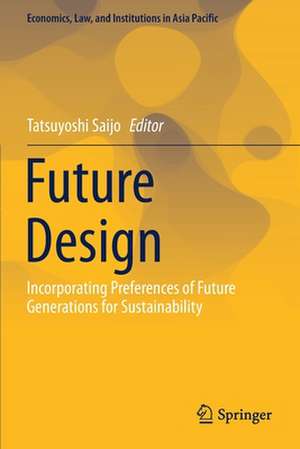Future Design: Incorporating Preferences of Future Generations for Sustainability: Economics, Law, and Institutions in Asia Pacific
Editat de Tatsuyoshi Saijoen Limba Engleză Paperback – 27 iul 2021
| Toate formatele și edițiile | Preț | Express |
|---|---|---|
| Paperback (1) | 778.45 lei 6-8 săpt. | |
| Springer Nature Singapore – 27 iul 2021 | 778.45 lei 6-8 săpt. | |
| Hardback (1) | 784.48 lei 6-8 săpt. | |
| Springer Nature Singapore – 26 iul 2020 | 784.48 lei 6-8 săpt. |
Din seria Economics, Law, and Institutions in Asia Pacific
-
 Preț: 282.94 lei
Preț: 282.94 lei - 18%
 Preț: 1134.24 lei
Preț: 1134.24 lei -
 Preț: 394.87 lei
Preț: 394.87 lei - 15%
 Preț: 699.77 lei
Preț: 699.77 lei - 18%
 Preț: 1011.14 lei
Preț: 1011.14 lei - 18%
 Preț: 1402.55 lei
Preț: 1402.55 lei - 18%
 Preț: 1397.82 lei
Preț: 1397.82 lei - 18%
 Preț: 728.43 lei
Preț: 728.43 lei - 18%
 Preț: 782.42 lei
Preț: 782.42 lei - 18%
 Preț: 779.08 lei
Preț: 779.08 lei -
 Preț: 423.47 lei
Preț: 423.47 lei -
 Preț: 313.82 lei
Preț: 313.82 lei -
 Preț: 427.71 lei
Preț: 427.71 lei - 18%
 Preț: 722.26 lei
Preț: 722.26 lei - 18%
 Preț: 725.43 lei
Preț: 725.43 lei - 18%
 Preț: 1110.24 lei
Preț: 1110.24 lei - 15%
 Preț: 698.15 lei
Preț: 698.15 lei - 15%
 Preț: 699.59 lei
Preț: 699.59 lei - 18%
 Preț: 730.79 lei
Preț: 730.79 lei - 18%
 Preț: 1001.50 lei
Preț: 1001.50 lei - 18%
 Preț: 950.21 lei
Preț: 950.21 lei
Preț: 778.45 lei
Preț vechi: 949.33 lei
-18% Nou
Puncte Express: 1168
Preț estimativ în valută:
148.99€ • 154.96$ • 124.86£
148.99€ • 154.96$ • 124.86£
Carte tipărită la comandă
Livrare economică 13-27 martie
Preluare comenzi: 021 569.72.76
Specificații
ISBN-13: 9789811554094
ISBN-10: 9811554099
Ilustrații: XII, 227 p. 47 illus., 26 illus. in color.
Dimensiuni: 155 x 235 mm
Greutate: 0.34 kg
Ediția:1st ed. 2020
Editura: Springer Nature Singapore
Colecția Springer
Seria Economics, Law, and Institutions in Asia Pacific
Locul publicării:Singapore, Singapore
ISBN-10: 9811554099
Ilustrații: XII, 227 p. 47 illus., 26 illus. in color.
Dimensiuni: 155 x 235 mm
Greutate: 0.34 kg
Ediția:1st ed. 2020
Editura: Springer Nature Singapore
Colecția Springer
Seria Economics, Law, and Institutions in Asia Pacific
Locul publicării:Singapore, Singapore
Cuprins
Introduction.- Future generations correcting markets and democracy research needs in future design.- Asymmetrical reciprocity in intergenerational justice.- Backcasting for envisioning sustainable futures across multiple generations.- Institutions for the future
Notă biografică
Tatsuyoshi Saijo received his master's degree in Economics from Hitotsubashi University in 1978 and his Ph.D. from the University of Minnesota in 1985. He was an Assistant Professor at the Department of Economics, University of California, Santa Barbara (1986–1991); Assistant Professor, Associate Professor, and then a Professor at the Institute of Socio-Economic Planning, University of Tsukuba (1988–1996); Postdoctoral Fellow at the Center in Political Economy, Washington University in St. Louis (1989); Professor at the Institute of Social and Economic Research, Osaka University (1995–2013); Visiting Scholar at the Rational Choice Center, Department of Economics, Duke University (1999); Faculty Fellow at the Research Institute of Economy, Trade and Industry (2001–2004); Research Associate at the California Institute of Technology (2002–2003); Professor at the Research Institute for Sustainability Science, Osaka University (2006–2010); Research Professor and then specially appointed Professor at the Center for Environmental Innovation Design for Sustainability, Osaka University (2011–2015); and Professor at the Institute of Economic Research, Hitotsubashi University (2015–2016) before assuming his present position at the Kochi University of Technology and the Research Institute for Humanity and Nature (RIHN). He has been a member of the Science Council of Japan since 2014, and was Project Leader for Experimental Social Science at the Ministry of Education, Japan (2007–2013) and Vice-President of the Economic Science Association (2010–2014).
Textul de pe ultima copertă
This book discusses imaginary future generations and how current decision-making will influence those future generations. Markets and democracies focus on the present and therefore tend to make us forget that we are living in the present, with ancestors preceding and descendants succeeding us. Markets are excellent devices to equate supply and demand in the short term, but not for allocating resources between current and future generations, since future generations do not exist yet. Democracy is also not “applicable” for future generations, since citizens vote for candidates who will serve members of their, i.e., the current, generation. In order to overcome these shortcomings, the authors discusses imaginary future generations and future ministries in the context of current decision-making in fields such as the environment, urban management, forestry, water management, and finance. The idea of imaginary future generations comes from the Native American Iroquois, who had strong norms that compelled them to incorporate the interests of people seven generations ahead when making decisions.
Caracteristici
Proposes a new “Future Design” framework to address current policies that are based on markets and democracy and do not consider future generations Demonstrates that “imaginary” future generations consisting of citizens rather than specialists but can be conceptualized through deliberation experiments Presents applications of Future Design to fields such as water, environment, innovation, cities and forest management, which will change our world
